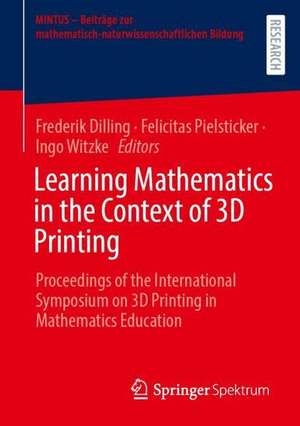Learning Mathematics in the Context of 3D Printing: Proceedings of the International Symposium on 3D Printing in Mathematics Education: MINTUS – Beiträge zur mathematisch-naturwissenschaftlichen Bildung
Editat de Frederik Dilling, Felicitas Pielsticker, Ingo Witzkeen Limba Engleză Paperback – 2 mar 2023
Preț: 640.92 lei
Preț vechi: 754.03 lei
-15% Nou
Puncte Express: 961
Preț estimativ în valută:
122.68€ • 133.30$ • 103.12£
122.68€ • 133.30$ • 103.12£
Carte tipărită la comandă
Livrare economică 21 aprilie-05 mai
Preluare comenzi: 021 569.72.76
Specificații
ISBN-13: 9783658388669
ISBN-10: 3658388668
Pagini: 321
Ilustrații: VI, 321 p. 196 illus., 172 illus. in color.
Dimensiuni: 148 x 210 mm
Greutate: 0.43 kg
Ediția:1st ed. 2022
Editura: Springer Fachmedien Wiesbaden
Colecția Springer Spektrum
Seria MINTUS – Beiträge zur mathematisch-naturwissenschaftlichen Bildung
Locul publicării:Wiesbaden, Germany
ISBN-10: 3658388668
Pagini: 321
Ilustrații: VI, 321 p. 196 illus., 172 illus. in color.
Dimensiuni: 148 x 210 mm
Greutate: 0.43 kg
Ediția:1st ed. 2022
Editura: Springer Fachmedien Wiesbaden
Colecția Springer Spektrum
Seria MINTUS – Beiträge zur mathematisch-naturwissenschaftlichen Bildung
Locul publicării:Wiesbaden, Germany
Cuprins
3D Printing in Mathematics Education—A Brief Introduction.- 3D Transformations for Architectural Models as a Tool for Mathematical Learning.- DiASper – Increasing the skills on occupationally relevant digital technologies among young people in Southern Denmark and the federal state of Schleswig-Holstein (Northern Germany).- Vignettes of Research on the Promise of Mathematical Making in Teacher Preparation.- Plane tessalation.- The Platonic solids.- Doing Mathematics with 3D Pens: Five Years of Research on 3D Printing Integration in Mathematics Classrooms.- Possibilities for STEAM Teachers using 3D modelling and 3D printing.- “I cannot simply insert any number there. That does not work” - A case study on the insertion aspect of variables.- Coding in the context of 3D printing..- Modelling and 3D-printing architectural models - A way to develop STEAM projects for mathematics classrooms.- Interfaces in Learning Mathematics Using 3D Printing Technology.- Mathematical Drawing Instruments and 3D Printing – (Re)designing and Using Pantographs and Integraphs in the Classroom.- 3D-Printing in Calculus Education—Concrete Ideas for the Hands-on Learning of Derivatives and Integral.- Maistaeder.
Notă biografică
Dr. Frederik Dilling is a research associate at the department of mathematics at the University of Siegen. His research focuses on digital technologies and interdisciplinarity in mathematics education and mathematics teacher training.
Dr. Felicitas Pielsticker works at the University of Siegen in the department of mathematics as a lecturer and researcher. Her research focuses on a holistic cognitive and neurofunctional description and analysis of mathematical knowledge development processes with digital technologies.
Prof. Dr. Ingo Witzke is professor for mathematics education at the University of Siegen. His research group investigates mathematical knowledge development processes of learners interacting with (digital) tools and resources.
Textul de pe ultima copertă
The volume presents a collection of articles on the use of 3D printing technology in mathematics education and in mathematics teacher training. It contains both basic research-oriented contributions as well as reflected descriptions of concrete developments for teaching. The authors of this compilation share a positive attitude towards the possibilities that the use of 3D printing technology (understood as an interplay of software and hardware) can unfold for mathematics education, but critically evaluate from a mathematics education research perspective when, where and how an application can enable an added value for the learning of a mathematical content.
The Editors
Dr. Frederik Dilling is a research associate at the department of mathematics at the University of Siegen. His research focuses on digital technologies and interdisciplinarity in mathematics education and mathematics teacher training.
Dr. Felicitas Pielsticker worksat the University of Siegen in the department of mathematics as a lecturer and researcher. Her research focuses on a holistic cognitive and neurofunctional description and analysis of mathematical knowledge development processes with digital technologies.
Prof. Dr. Ingo Witzke is professor for mathematics education at the University of Siegen. His research group investigates mathematical knowledge development processes of learners interacting with (digital) tools and resources.
Caracteristici
Positive attitude towards the possibilities of the use of 3D printing technology Impulses for a meaningful use of 3D printing technology Perspectives on mathematics teaching related to the use of 3D printing technology











